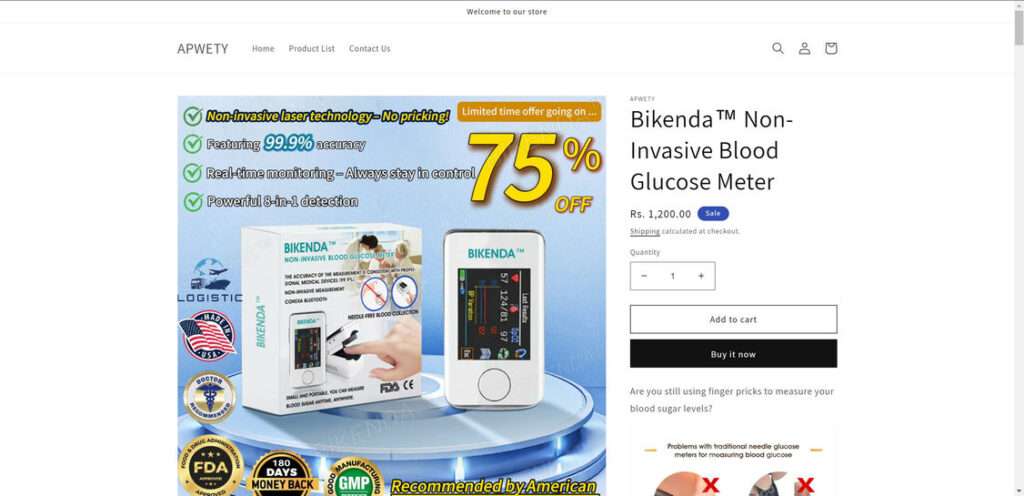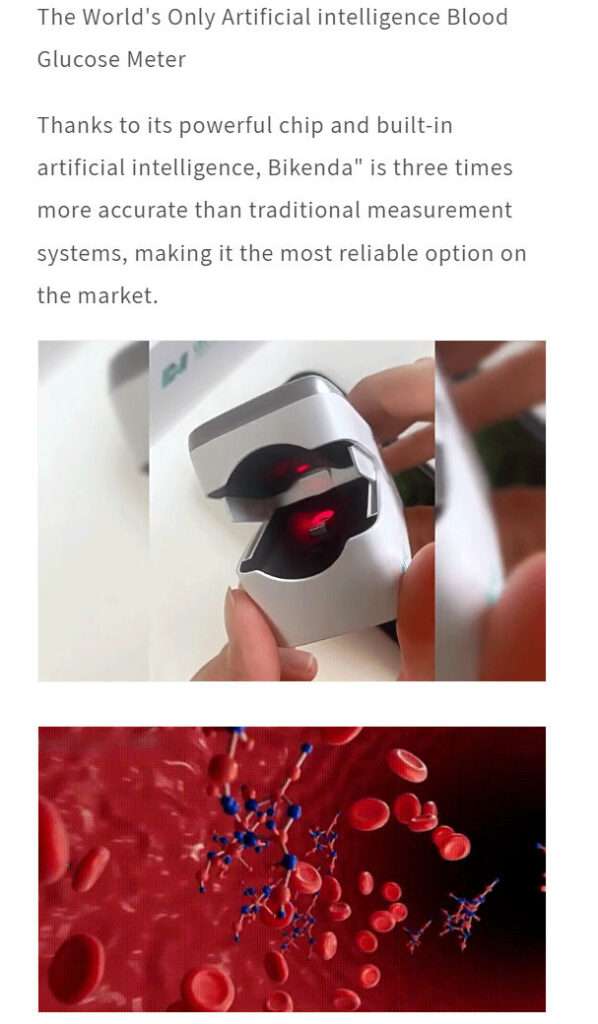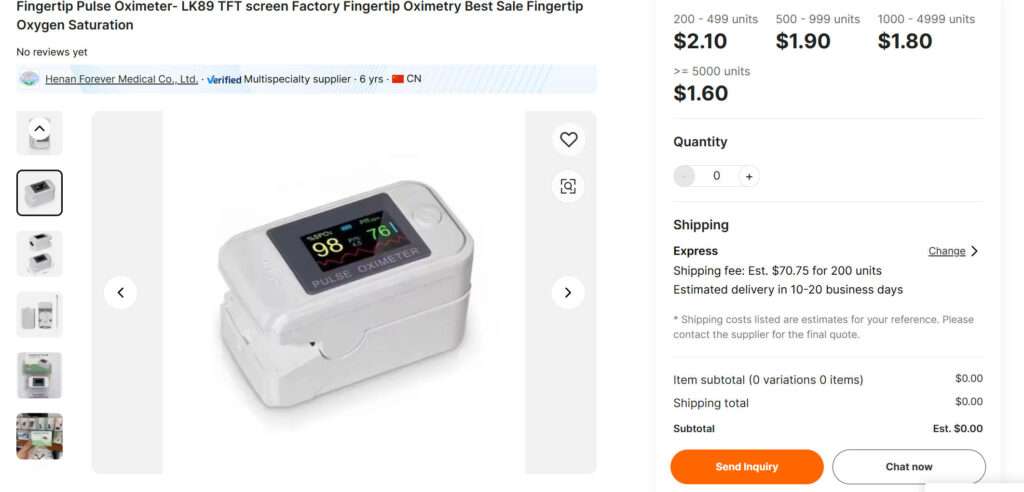For people with diabetes, regularly monitoring blood glucose levels is crucial for maintaining health. Recently, ads for a new device called the Bikenda Non-Invasive Blood Glucose Meter have been circulating on social media. These ads claim that this meter can accurately measure blood glucose levels without finger pricks or test strips, using “advanced German technology.” However, the reality is that this product does not work as advertised, and is a scam designed to take advantage of people with diabetes.
This article will provide an in-depth explanation of how the Bikenda meter scam works, including:
- An overview of the scam
- How the scammers operate
- What victims receive if they purchase the product
- Why it does not work as claimed
- What to do if you have fallen victim to this scam
Read on to learn more about how to protect yourself from the Bikenda Non-Invasive Blood Glucose Meter scam.

Scam Overview
The Bikenda Non-Invasive Blood Glucose Meter scam operates by advertising the meter through social media platforms like Facebook, Instagram and TikTok. Scammers create ads that make exaggerated claims about the meter’s accuracy and abilities.
For example, the ads state that the Bikenda meter uses “advanced German technology” to measure blood glucose without finger pricks or test strips. They claim it provides “99.9% accuracy” and is “three times more accurate than traditional measurement systems.”
The ads also say it connects to your phone via Bluetooth to give you “detailed analyses and customized reports” of your levels. Basically, it is portrayed as a revolutionary new method for effortlessly tracking your blood sugar.
These ads often use fake reviews, stock images of people using the product, and other deceptive marketing tactics. The ads drive people to shady websites where the Bikenda meter can be purchased for around $39. In some cases, the scammers try to upsell victims to buy multiple meters in bulk for around $99.

However, the product that arrives in the mail is not actually the revolutionary blood glucose meter advertised. The victim receives a cheap fingertip pulse oximeter available on sites like Alibaba for around $3.
This type of pulse oximeter simply measures your pulse rate and blood oxygen saturation level. It cannot test blood glucose. Yet the victims have already paid far more than the device is worth, believing they were buying an innovative meter.
How the Scam Works
The scammers behind the Bikenda Non-Invasive Blood Glucose Meter scam have optimized their strategies to deceive victims and profit from the sale of these useless products. Here is a step-by-step explanation of how the scam typically operates:
- Ads promoting the fake product are created: The scammers design slick ads promoting the Bikenda meter as a revolutionary new blood glucose monitoring device. The ads contain exaggerated or outright false claims about the meter’s accuracy, convenience and technical capabilities.
- Ads are disseminated on social media: The scam ads are targeted to people with interests related to diabetes and blood sugar monitoring. They often appear in Facebook feeds, Instagram stories or TikTok feeds. Clicking the ad brings the victim to the scammer’s sales website.
- Deceptive sales sites misrepresent the product: On the sales site, the Bikenda meter continues to be deceitfully marketed with fake reviews, stock images and other standard scam tactics. The victim is led to believe this is a legitimate medical device.
- Victims purchase the product: Convinced by the scam ads and sales pages, victims purchase the Bikenda meter, usually paying around $39 for one unit. The scammers may try to upsell them to buy multiple units at a discounted bulk rate.
- Cheap pulse oximeter arrives in the mail: Several weeks later, the victim receives their order in the mail. However, instead of the advertised blood glucose meter, they receive a cheap generic pulse oximeter available on Chinese wholesale sites for under $5.
- Scammers pocket the profit: The scammers have now profited by pocketing the difference between the manufacturing cost of the cheap pulse oximeters and the amount victims were deceived into paying. Each successful scam nets them over $30 profit per order.
This is how the scammers behind the Bikenda meter are able to operate the scam efficiently and maximize profits – luring in victims with convincing marketing and sending cheap, ineffective products.
What Victims Receive
So what exactly arrives when victims receive their order of the Bikenda Non-Invasive Blood Glucose Meter?
Instead of the high-tech meter advertised, victims receive a generic fingertip pulse oximeter like this one:

This is a common type of pulse oximeter that can be purchased for under $3 per unit on sites like Alibaba or Aliexpress. It is a small device that clips onto your fingertip to measure your pulse rate and blood oxygen saturation level.
However, this type of pulse oximeter has no capability to actually test blood glucose. It does not use any “advanced German technology” or provide “99.9% accuracy.” There is no app connectivity or blood sugar analysis.
Essentially, victims are receiving a cheap product easily sourced for a few dollars, while paying up to $39 per unit – over 10 times what the scammers paid for it. The scammers profit from the difference.
The packaging and branding for the product may make it look like the advertised Bikenda meter. But the device inside is just a generic clone pulse oximeter relabeled to appear like the promised blood sugar monitor. Either way, it cannot function as the innovative meter victims believed they were purchasing.
Why It Doesn’t Work
There are a few key reasons why the product victims receive in the Bikenda Non-Invasive Blood Glucose Meter scam does not actually work as advertised:
- Limited capabilities: The cheap pulse oximeter can only measure pulse rate and blood oxygen saturation. It does not have the technology to test blood sugar.
- No calibration: Blood glucose monitoring requires calibration with test strips and fingerstick samples for accuracy. The received product has no calibrations.
- No connectivity: It lacks wireless connectivity to sync data with a smartphone app. It has no display for results other than pulse and oxygen levels.
- Flimsy quality: The generic device sent is poorly constructed with flimsy plastic and an unreliable battery. Most stop working properly within a few weeks.
- No accuracy data: There is no evidence that the pulse oximeter has been tested or validated for accuracy as claimed in the ads.
- Not really non-invasive: Pulse oximetry works by shining light through your fingertip – so it is not truly a non-invasive method like the ads suggest.
So in summary, the device victims receive has no actual ability to measure blood glucose levels, despite the scammers’ false claims. It provides no valuable health data and is unlikely to last more than a few weeks. The ads are pure fiction intended to deceive potential victims.
What to Do if You Are Scammed
If you have fallen victim to the Bikenda Non-Invasive Blood Glucose Meter scam, here are some steps you can take:
- Contact your bank: If you used a credit card, report the fraudulent charge and ask to have the payment reversed. Provide evidence showing the product was misrepresented.
- Report the seller: Look up the seller on sites like TrustPilot and the Better Business Bureau to see if others were scammed. Leave a review detailing the scam to warn others.
- Issue a chargeback: For payments through services like PayPal, issue a chargeback request in your PayPal account. Provide documentation of how the product was a scam.
- Contact authorities: File complaints with groups like the Federal Trade Commission, state consumer protection agencies, and even your local police.
- Spread awareness: Share your experience in diabetes forums and social media groups to help prevent others from being scammed.
- Learn from it: Use this as a lesson to be more diligent about double-checking medical product claims in the future before purchasing. Only buy from reputable sources.
The most important thing is notifying your bank as soon as possible to stop payments and hopefully obtain refunds. Additionally, reporting the scam can help warn other potential victims and hopefully shut down these deceitful marketers. Don’t blame yourself – scammers are manipulating your desire to manage your health.
Frequently Asked Questions about the Bikenda Meter Scam
1. What is the Bikenda Non-Invasive Blood Glucose Meter?
The Bikenda meter is advertised online and on social media as a revolutionary new way to test blood sugar without finger pricks, using “advanced German technology” to provide instant results with 99.9% accuracy. However, it is a scam – the product shipped to customers is a cheap pulse oximeter, not a blood glucose meter.
2. How does the Bikenda meter scam work?
Scammers create flashy ads promoting the fictional meter, claiming it’s a breakthrough medical device. The ads target people with diabetes and direct them to shady websites to purchase the Bikenda meter for around $39. In reality, victims receive a generic pulse oximeter worth only a few dollars.
3. What do you actually receive if you buy the Bikenda meter?
Instead of a blood glucose meter, customers receive a fingertip pulse oximeter – a small device that reads your pulse rate and oxygen levels. It cannot measure blood sugar. The scammers profit by pocketing the difference between the cost of the cheap oximeter and the amount victims were deceived into paying.
4. What are the red flags of the Bikenda meter scam?
Red flags include exaggerated claims about the meter’s accuracy, capabilities and technology, such as using terms like “German engineering,” “non-invasive,” or “99.9% accuracy.” Too-good-to-be-true testimonials, prices and photos are also warning signs of a scam.
5. Why doesn’t the pulse oximeter work as a blood glucose meter?
The received pulse oximeter lacks the technology to measure blood glucose levels. It has no way to calibrate with test strips, no app connectivity, low quality construction and no accuracy validation. It simply cannot function as advertised.
6. What should you do if you are scammed by the Bikenda meter?
First, contact your bank to dispute the charges. Report the seller to the Better Business Bureau, leave reviews about the scam experience and file complaints with consumer protection groups to warn others. You can also report mail fraud.
7. How can you protect yourself from the Bikenda scam?
Avoid making health product purchases based solely on social media ads. Carefully research the seller first and consult a real doctor. Watch for exaggerated claims, free trial scams and miracle cure promises. Pay with a credit card whenever possible for purchase protection.
8. Where should you report Bikenda meter scams?
Report this scam to the Federal Trade Commission, your state consumer protection agency, local police, the FDA or US Postal Inspection Service to help warn and protect other consumers from falling victim.
9. What is the bottom line on the Bikenda meter scam?
The bottom line is the Bikenda meter is a complete scam preying on vulnerable people seeking better health management. Always apply critical thinking when evaluating medical device claims to protect your health and finances.
The Bottom Line
The bottom line is that the Bikenda Non-Invasive Blood Glucose Meter is a complete scam. The ads for this product seen on social media use exaggerated and false claims to promote it as a medical breakthrough. In reality, those who purchase it receive a cheap generic pulse oximeter that cannot measure blood sugar.
It is important to be vigilant about medical device ads online. Scammers know that people managing health conditions like diabetes are especially motivated buyers.
Protecting Yourself from Scams
The rise of medical scams like the Bikenda meter target vulnerable populations and leverage their desire for better health management. Here are some tips to avoid falling victim to these deceptive schemes:
- Verify seller reputation – Research the company selling a product before purchasing. Check sites like TrustPilot and social media for reviews mentioning scams.
- Watch for exaggerated claims – If a product seems too good to be true, it probably is. Overly optimistic claims are a red flag.
- Consult a real doctor – Ask your physician before purchasing a medical monitoring device, especially if the company is unfamiliar.
- Beware ads for “miracle cures” – The FDA cautions against products claiming to cure serious diseases like diabetes. Carefully scrutinize such claims.
- Avoid “free trial” offers – Free trials often enroll you in expensive subscriptions without adequate consent. Read the fine print carefully first.
- Pay with a credit card – Credit cards allow you to dispute a purchase if the product was misrepresented or never arrived.
Stay vigilant and trust your instincts – if a medical product seems questionable, it is better to avoid the risk of being scammed. Protect yourself and your health.
Reporting Scams to Authorities
If you do become the victim of a medical device scam like the Bikenda meter, it is important to report it to the proper authorities in addition to your bank. This can help prevent other vulnerable consumers from being targeted. Here are some ways to report these scams:
- Better Business Bureau (BBB) – File a scam report with your local BBB to put warnings on the company’s review profile.
- Federal Trade Commission (FTC) – Report the fraud to the FTC, who investigates deceptive business practices.
- State consumer protection agency – Each state has its own agency that handles consumer complaints and fraud.
- Local police – File a report with your local police department regarding the fraudulent activity.
- U.S. Postal Inspection Service – Mail fraud can be reported to the USPIS for investigation.
- FDA – For medical device scams, report to the FDA’s Health Fraud Program for regulatory action.
Reporting scams can help authorities locate and stop the operations of deceitful manufacturers and marketers exploiting consumers. Don’t stay silent – speak up to protect public health.
Conclusion
The Bikenda Non-Invasive Blood Glucose Meter scam reveals the dark side of dishonest manufacturers preying on the health needs of consumers. By spreading awareness and reporting these schemes, we can cut off their ability to keep profiting at the expense of people’s well-being.
Always apply critical thinking when you encounter health product claims that seem too good to be true. And empower yourself by questioning, researching, and consulting professionals before making purchases. Stay vigilant, and don’t let scammers shake your confidence in managing your health responsibly.










